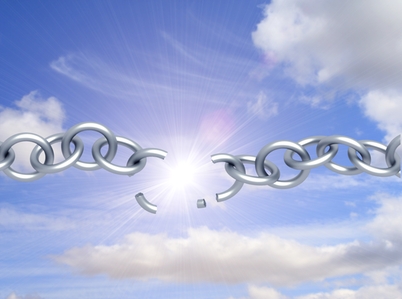Letting Go of the Past with Mindfulness Meditation, Part 1

Many of us have difficulty letting go of the past, and moving on with our lives. For some of us, it may seem down right impossible, and it can have serious consequences to our physical, mental, and emotional well-being.
Attachment to the past is such an ingrained characteristic of the human condition that a great deal of spiritual and psychological studies are devoted to the subject.
In this two-part article series, we’re going to examine the nature of attachment from a Buddhist psychology perspective. In Part 1, we’ll see how it manifests itself to draw us to the past. We will examine it specifically from the perspective of the Five Hindrances—the obstacles to our spiritual development.
In Part 2, we’ll discuss how we can use mindfulness meditation, and other tools, to let go of our past, so we can be free of it. We will see how living in the present moment will enable us to find true happiness and inner peace.
The Five Hindrances
Those of you who are familiar with Buddhism have probably heard of the Five Hindrances. These are basically 5 negative states of mind that are obstacle in our mindfulness meditation practice, and prevent us from achieving freedom from our suffering.
The Five Hindrances are sensual desire, aversion, restlessness, sloth/torpor, and doubt. These hindrances will manifest themselves into various behaviors that can often keep us dwelling in the past and living unmindfully.
The Five Hindrances are primarily a concern in our mindfulness meditation practice. However, as we shall see, they can also prevent us from letting go of our past. They are the sources of much of our unhappiness.
Sensual Desire
Most of us are brought up to believe that we can achieve happiness by stimulating our senses. When we positively stimulate our senses, we trigger positive emotions. For example, when we have a delicious meal at a nice restaurant, we stimulate our sense of sight, taste, and smell. If they are pleasing, we feel satisfied and content.
The problem with depending on sensual desire for our happiness is that it is short-lived. When the pleasant emotions wear off, we need to indulge in that behavior again in order to experience the same gratifying emotions. If we don’t know healthier ways of dealing with our emotions, sensual desire can become an obsession. This is the nature of alcoholism and drug addiction, or any other addiction, for that matter.
So, how does sensual desire keep us living in the past? Many of us have pleasant memories of our past. When we remember them, we trigger positive emotions such as love, warmth and security. There is nothing inherently wrong with having wonderful memories of our past.
The problem arises when we begin to depend on them for our happiness, at the expense of our happiness in the present. There reaches a point when these memories become obstacles to our freedom. In other words, they keep us anchored to our past. A good example is a past relationship. Has a prior romantic relationship ever been a problem with a present relationship?
Aversion and Ill Will
Aversion is simply the opposite of sensual desire. Instead of longing for the past, we try to run from it because of painful memories that stir up unwholesome emotions such as anger, resentment, guilt, and regret.
These memories keep us stuck in the past because we don’t feel these experiences have been resolved. For example, someone may have abused us when we were children, and we’re waiting for that person to rectify the situation, which is usually unlikely. The person who harmed us may be unwilling, unable, or no longer alive.
The truth is we will never be free until we repair the damage ourselves. It may not be just, but it is necessary if we want to be happy and free. In the next article, we’ll see how mindfulness meditation will help us cultivate the compassion and forgiveness we need to let go of past injustices.
On the other hand, some of us may have harmed others or ourselves. If we have harmed someone else, then we feel guilt. If we have harmed ourselves, then we feel regret. As with harm from others, it may not be entirely feasible to undo the damage. In this case, however, we should make an effort to make amends, and right the wrongs we have made. This will not only help us forgive ourselves, but it will also help heal the wounds of our victims.
Restlessness and Agitation
Restlessness and agitation are caused by the over-stimulation of our minds. Very often, we’re surrounded by a great deal of activity, noise, and visual stimuli. All these trigger thoughts, which eventually gain so much momentum that it becomes difficult to quiet our mind.
Restlessness keeps us in the past by continually triggering old memories, whether they’re pleasant or unpleasant. Our mind develops habit energy because the thoughts are able to travel only along the same neural pathways. In order to break this cycle, we need to allow the mind to settle down, and learn to live in the present moment. This will enable us to develop new neural pathways unrelated to the past.
Sloth and Torpor
Sloth and torpor are dullness of the mind. They are the opposite extreme of restlessness and agitation. Some of us don’t want to devote the time and effort it takes to process new information. We would rather shut down our senses and thinking. Some people even use alcohol and drugs to help them dull their minds.
The way it keeps us in the past is similar to restlessness. It prevents us from developing neural pathways related to the present. So, we end up stuck in the past. This is one of the major reasons why alcoholics and drug addicts are haunted by their past. Another reason is that their addiction causes them to do shameful things in order to feed their habits, which leads to more feelings of guilt, shame, and remorse.
Doubt
Doubt is the fifth hindrance that can keep us clinging to the past. Most of us are uncertain about the future. That is normal. With mindfulness, however, we can gain some idea of how certain events are likely to unfold, but there still remains an element of uncertainty.
There are many factors in any given situation that we cannot account for. However, the mindful person knows how to increase the chances of a positive outcome, and is able to accept the remaining uncertainty—so he tends to be more optimistic.
Those who are less mindful have more difficulty accepting uncertainty, because it makes them feel powerless to influence their happiness. To them, memories of the past, whether happy or unhappy, provide them with a modest degree of certainty, and therefore, comfort.
Furthermore, those who are stuck in the past often believe that if they can recreate the same conditions of happier times, then they will be happy once again. They think that if only a lost love would take them back, or if their family would reunite, then they will be happy. So they spend a great deal of time and energy trying to make the past a reality once again. At the core of this line of thinking is a doubt about their future—or more importantly, their present.
Conclusion
Old memories can easily lure us back in time if we are not mindful. As we’ve seen, the Five Hindrances manifest themselves in various ways to distract us from the present moment. This is why they’re called hindrances.
There is nothing wrong with remembering the past. It can teach us some valuable lessons about ourselves and human nature. On the other hand, if we have strong attachments to the past, they can have serious physical, mental, and emotional consequences. They will clearly hinder our present-day relationships.
In part 2 of this article, we’ll find out how to overcome the Five Hindrances, so we can let go of the past, and learn how to find joy and fulfillment in the present. In particular, we’ll learn how to use mindfulness meditation to heal the wounds from our past, so that painful memories no longer haunt us. We will also learn how to enjoy happy memories without clinging to them.
Imagine the possibilities. You’ll be able to take charge of your life without your past holding you back. Your relationships will certainly improve. And when you finally let go of your past, you’ll learn the true meaning of the word freedom.
Need help learning mindfulness meditation? Check out Mindfulness Meditation Made Simple: Your Guide to Finding True Inner peace (paperback).
If you enjoyed this article, sign up below for the Blooming Lotus Newsletter and we’ll notify you when the next article is released:





0 Comments